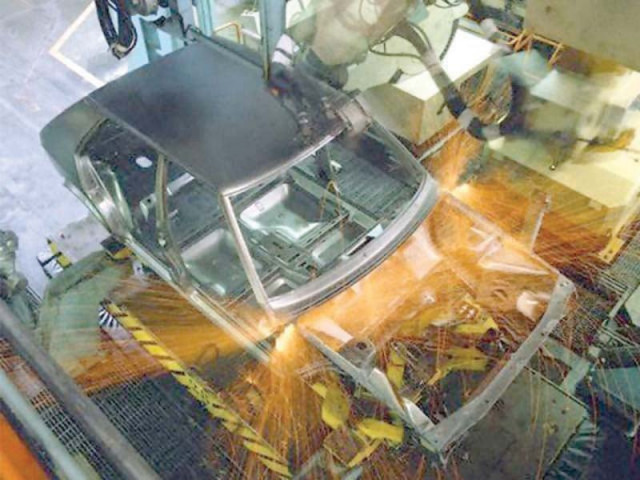BASF looks for new opportunities in Pakistan
FDI, auto industry expansion will impact company’s sales positively

The contribution of the automobile industry to Pakistan’s gross domestic product is about 3%, which is very small compared with the double-digit share in China. PHOTO: FILE
“Since Pakistan’s automobile industry is much smaller compared with regional countries, it offers a huge growth potential,” he says in an interview with The Express Tribune.
The contribution of automobile industry to Pakistan’s gross domestic product is about 3%, which is very small compared with the double-digit share in China. However, with the growing population and the small industry size, the country will become a big market in coming years, believes Tay, who has come to Pakistan to get firsthand information of requirements of the automobile sector.
Renault to start assembling cars in Pakistan by 2018, says Board of Investment
BASF is a leading chemical company that employs over 100,000 people and has over 300 production sites around the world.
The company supplies its products to many Original Equipment Manufacturers (OEMs) in Pakistan and any fresh foreign direct investment (FDI) or expansion in the auto sector will have a positive impact on its sales.
Easy partnerships
If Chinese OEMs come to Pakistan, it will make it easy for BASF to provide solutions to them because the company is already doing business with them in China. This will bring additional FDI because second-tier auto companies will also invest in Pakistan.
“Pakistan has a very young population which is why companies like us need to have a long-term view of this market,” he says.

Jui, who was born in Singapore and is based in Shanghai, looks very impressed with the kind of joint ventures Pakistan’s auto companies have with Japanese carmakers. Based on his interaction with domestic companies, he finds them very enthusiastic about the potential impact of the China-Pakistan Economic Corridor (CPEC).
Replying to a question, he stresses, “Gone are the days when the one-size-fit-all strategy was workable. Today, you cannot apply global solutions everywhere as different countries have different requirements.”
For instance, Chinese customers hate any odour in the interior of new cars whereas the Europeans believe odour means the vehicle is new. “So as a global company we know how important cultural aspects are and how are they interlinked with the products we deliver.”
Commenting on the absence of a research and development (R&D) centre in Pakistan, he says BASF does not need to undertake research work everywhere.
Chinese group eyes $3b deals in Pakistan roads, energy sector
“I am in Pakistan and if I see the need for a product, I will see if it can be made anywhere else in the world. If not, then I will go to my R&D department and tell them that this is what Pakistani customers want.”
BASF operations
BASF has been in Pakistan for over four decades. In the past few years, it has recorded double-digit growth in its various businesses such as construction, personal care, leather and petrochemicals.
BASF Chemicals and Polymers Pakistan Managing Director Faisal Akhtar comments that Pakistan is a massive market and economic indicators are flashing green for many international companies, including BASF, to do more.
He believes the overall situation looks positive because interest rate in the country is at a 42-year low and inflation has been tamed at about 3%. The currency is stable and foreign exchange reserves have jumped to an all-time high.
Talking about challenges, Akhtar says there are certain elements that affect business in the country.
At present, the gravest problem is the precarious law and order situation. Secondly, much of the funds are earmarked for power stations to ease chronic shortages which hobble the business and investment.
“The government needs to adopt a more business-friendly tax culture and ensure consistency in economic policies,” he adds.
The writer is a staff correspondent
Published in The Express Tribune, November 7th, 2016.
Like Business on Facebook, follow @TribuneBiz on Twitter to stay informed and join in the conversation.



















COMMENTS
Comments are moderated and generally will be posted if they are on-topic and not abusive.
For more information, please see our Comments FAQ